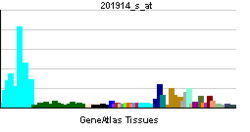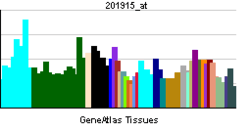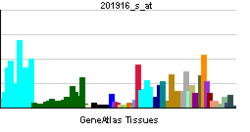SEC63
| SEC63 | ||||||
|---|---|---|---|---|---|---|
| Identifiers | ||||||
| Aliases | SEC63, DNAJC23, ERdj2, PRO2507, SEC63L, SEC63 homolog, protein translocation regulator | |||||
| External IDs | MGI: 2155302 HomoloGene: 5220 GeneCards: SEC63 | |||||
| RNA expression pattern | ||||||
   | ||||||
| More reference expression data | ||||||
| Orthologs | ||||||
| Species | Human | Mouse | ||||
| Entrez | ||||||
| Ensembl | ||||||
| UniProt | ||||||
| RefSeq (mRNA) | ||||||
| RefSeq (protein) | ||||||
| Location (UCSC) | Chr 6: 107.87 – 107.96 Mb | Chr 10: 42.76 – 42.83 Mb | ||||
| PubMed search | [1] | [2] | ||||
| Wikidata | ||||||
| View/Edit Human | View/Edit Mouse |
Translocation protein SEC63 homolog is a protein that in humans is encoded by the SEC63 gene.[3][4][5]
Function
The Sec61 complex is the central component of the protein translocation apparatus of the endoplasmic reticulum (ER) membrane. The protein encoded by this gene and SEC62 protein are found to be associated with ribosome-free SEC61 complex. It is speculated that Sec61-Sec62-Sec63 may perform post-translational protein translocation into the ER. The Sec61-Sec62-Sec63 complex might also perform the backward transport of ER proteins that are subject to the ubiquitin-proteasome-dependent degradation pathway. The encoded protein is an integral membrane protein located in the rough ER.[5]
Clinical significance
Mutations of this gene have been linked with autosomal dominant polycystic liver disease.[6]
References
- ↑ "Human PubMed Reference:".
- ↑ "Mouse PubMed Reference:".
- ↑ Woollatt E, Pine KA, Shine J, Sutherland GR, Iismaa TP (Jun 1999). "Human Sec63 endoplasmic reticulum membrane protein, map position 6q21". Chromosome Res. 7 (1): 77. doi:10.1023/A:1009283530544. PMID 10219736.
- ↑ Skowronek MH, Rotter M, Haas IG (Nov 1999). "Molecular characterization of a novel mammalian DnaJ-like Sec63p homolog". Biol Chem. 380 (9): 1133–8. doi:10.1515/BC.1999.142. PMID 10543453.
- 1 2 "Entrez Gene: SEC63 SEC63 homolog (S. cerevisiae)".
- ↑ Davila S, Furu L, Gharavi AG, Tian X, Onoe T, Qian Q, Li A, Cai Y, Kamath PS, King BF, Azurmendi PJ, Tahvanainen P, Kääriäinen H, Höckerstedt K, Devuyst O, Pirson Y, Martin RS, Lifton RP, Tahvanainen E, Torres VE, Somlo S (June 2004). "Mutations in SEC63 cause autosomal dominant polycystic liver disease". Nat. Genet. 36 (6): 575–7. doi:10.1038/ng1357. PMID 15133510.
Further reading
- Meyer HA, Grau H, Kraft R, et al. (2000). "Mammalian Sec61 is associated with Sec62 and Sec63.". J. Biol. Chem. 275 (19): 14550–7. doi:10.1074/jbc.275.19.14550. PMID 10799540.
- Ponting CP (2001). "Proteins of the endoplasmic-reticulum-associated degradation pathway: domain detection and function prediction.". Biochem. J. 351. Pt 2: 527–35. PMC 1221390
 . PMID 11023840.
. PMID 11023840. - Strausberg RL, Feingold EA, Grouse LH, et al. (2003). "Generation and initial analysis of more than 15,000 full-length human and mouse cDNA sequences.". Proc. Natl. Acad. Sci. U.S.A. 99 (26): 16899–903. doi:10.1073/pnas.242603899. PMC 139241
 . PMID 12477932.
. PMID 12477932. - Ota T, Suzuki Y, Nishikawa T, et al. (2004). "Complete sequencing and characterization of 21,243 full-length human cDNAs.". Nat. Genet. 36 (1): 40–5. doi:10.1038/ng1285. PMID 14702039.
- Davila S, Furu L, Gharavi AG, et al. (2004). "Mutations in SEC63 cause autosomal dominant polycystic liver disease.". Nat. Genet. 36 (6): 575–7. doi:10.1038/ng1357. PMID 15133510.
- Gerhard DS, Wagner L, Feingold EA, et al. (2004). "The status, quality, and expansion of the NIH full-length cDNA project: the Mammalian Gene Collection (MGC).". Genome Res. 14 (10B): 2121–7. doi:10.1101/gr.2596504. PMC 528928
 . PMID 15489334.
. PMID 15489334. - Otsuki T, Ota T, Nishikawa T, et al. (2007). "Signal sequence and keyword trap in silico for selection of full-length human cDNAs encoding secretion or membrane proteins from oligo-capped cDNA libraries.". DNA Res. 12 (2): 117–26. doi:10.1093/dnares/12.2.117. PMID 16303743.
- Ewing RM, Chu P, Elisma F, et al. (2007). "Large-scale mapping of human protein-protein interactions by mass spectrometry.". Mol. Syst. Biol. 3 (1): 89. doi:10.1038/msb4100134. PMC 1847948
 . PMID 17353931.
. PMID 17353931. - You KT, Li LS, Kim NG, et al. (2007). "Selective translational repression of truncated proteins from frameshift mutation-derived mRNAs in tumors.". PLoS Biol. 5 (5): e109. doi:10.1371/journal.pbio.0050109. PMC 1854916
 . PMID 17456004.
. PMID 17456004.